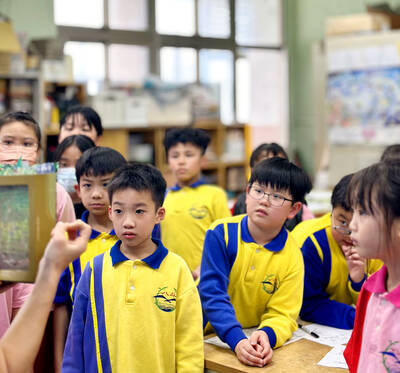The diverse range of folks at last year’s annual Canada D’eh party brought the country’s multi-cultural ethic to life with people from not only Taiwan and Canada, but South Africa, Jamaica, South Korea, the US and other nations attending the family-friendly outdoor barbeque.
“Likely about 35 percent are Canadian or have lived in Canada. It is really open to everyone,” said organizer and Canadian Society board member Kevin Dempsey. He estimates there are about 50,000 Canadians living in Taiwan but says “nobody knows for sure.”
About 3,200 Canucks and friends attended last year’s party at Shalun Beach (沙崙) in Tamsui, organizers say, and they expect as many will head back today to a popular venue in the countryside near Baishawan (白沙灣) where the festival was held two years ago.
Dempsey thinks this venue is just more fun than last year’s. “Most of the Canada D’eh’s have been here. We moved it back because it is a better atmosphere and easier to manage,” he said.
It’s beers, beef, bands and beach with a range of sports for adults and activities for children. The meat-heavy menu has hot dogs, hamburgers, whole roast pigs and, new this year, barbecue Canadian roast beef. Beer, wine, and non-alcoholic drinks will be available as well. All transactions are made with coupons; the door charge garners a few and more can be purchased, which is best done sooner than later because long lines tend to form for coupons as the day goes on. One coupon will get you a non-alcoholic beverage or fries, two snags a beer, wine or most food items, and it takes four to get a Guinness. Unused coupons will not be refunded.
Activities include beach volleyball and soccer, a hockey shoot-out and tug-o-war.
There will be face-painting, and though every year they say it’s “for kids,” many adults sport Canadian flags on their faces and appendages. Day-trippers are advised to bring sunscreen and wear a hat — even when it’s pouring in Taipei, the weather can be dramatically different outside the city.
Those more inclined to sprawl on plastic chairs under awnings drinking beer will appreciate the arrival of DJs Dominik T and Rick Kraft who will play from 4pm, with other entertainment from 6pm. An Aboriginal Dance troupe will be followed by the raffle draw and then BoPoMoFo (ㄅㄆㄇㄈ) blues band. Other acts include I/O Band, ABS (All Blues and Soul) and Wailin’ Soul.
“It’s a great event, always lots of fun,” said BoPoMoFo frontman Douglas Charles Rapier, whose band has played at three prior Canada D’eh’s.
“We’ve got a reputation for a great fireworks show,” he added, “but this year it has been dramatically expanded and will be our biggest ever.”
A word of warning: Bands are scheduled until 11:50pm, but the last shuttle buses to Hongshulin MRT Station (紅樹林捷運站), the last station on the Red Line before Danshui (Tamsui) MRT Station (淡水捷運站), leave at 11pm. The last 10 buses go straight to Luxy, where Canada D’eh guests can get in for half price. Canada D’eh itself doesn’t end until midnight, which is when the last train leaves Danshui MRT Station. That puts the only duh in the D’eh.

May 26 to June 1 When the Qing Dynasty first took control over many parts of Taiwan in 1684, it roughly continued the Kingdom of Tungning’s administrative borders (see below), setting up one prefecture and three counties. The actual area of control covered today’s Chiayi, Tainan and Kaohsiung. The administrative center was in Taiwan Prefecture, in today’s Tainan. But as Han settlement expanded and due to rebellions and other international incidents, the administrative units became more complex. By the time Taiwan became a province of the Qing in 1887, there were three prefectures, eleven counties, three subprefectures and one directly-administered prefecture, with

It’s an enormous dome of colorful glass, something between the Sistine Chapel and a Marc Chagall fresco. And yet, it’s just a subway station. Formosa Boulevard is the heart of Kaohsiung’s mass transit system. In metro terms, it’s modest: the only transfer station in a network with just two lines. But it’s a landmark nonetheless: a civic space that serves as much more than a point of transit. On a hot Sunday, the corridors and vast halls are filled with a market selling everything from second-hand clothes to toys and house decorations. It’s just one of the many events the station hosts,

Through art and storytelling, La Benida Hui empowers children to become environmental heroes, using everything from SpongeBob to microorganisms to reimagine their relationship with nature. “I tell the students that they have superpowers. It needs to be emphasized that their choices can make a difference,” says Hui, an environmental artist and education specialist. For her second year as Badou Elementary’s artist in residence, Hui leads creative lessons on environmental protection, where students reflect on their relationship with nature and transform beach waste into artworks. Standing in lush green hills overlooking the ocean with land extending into the intertidal zone, the school in Keelung

Taiwan Power Co (Taipower, 台電) and the New Taipei City Government in May last year agreed to allow the activation of a spent fuel storage facility for the Jinshan Nuclear Power Plant in Shihmen District (石門). The deal ended eleven years of legal wrangling. According to the Taipower announcement, the city government engaged in repeated delays, failing to approve water and soil conservation plans. Taipower said at the time that plans for another dry storage facility for the Guosheng Nuclear Power Plant in New Taipei City’s Wanli District (萬里) remained stuck in legal limbo. Later that year an agreement was reached